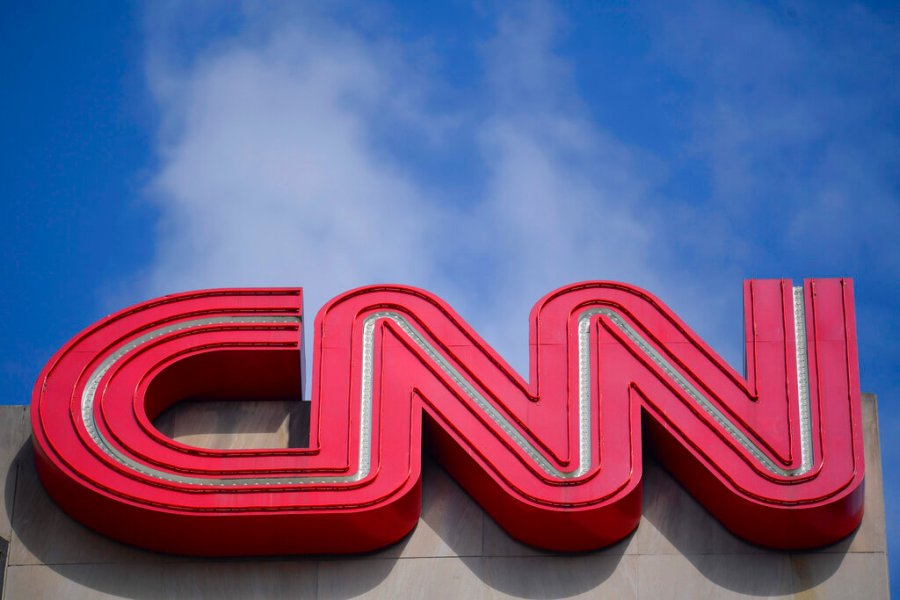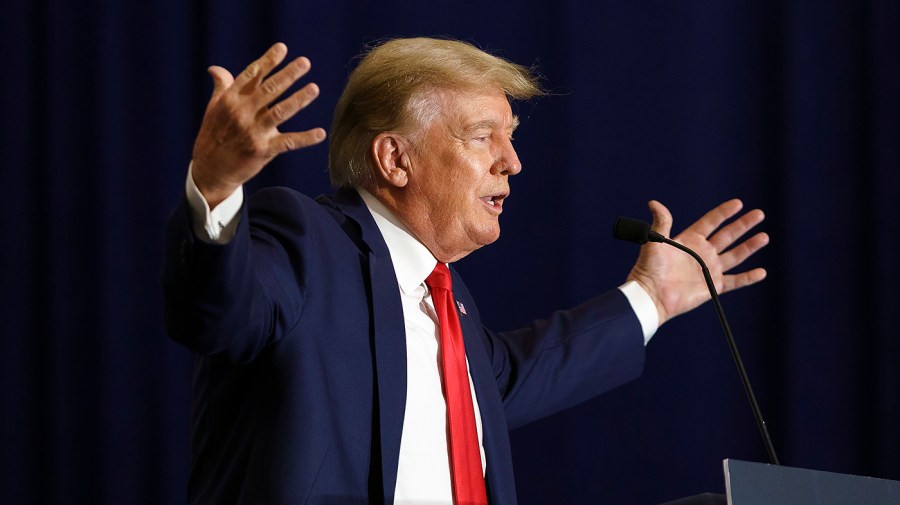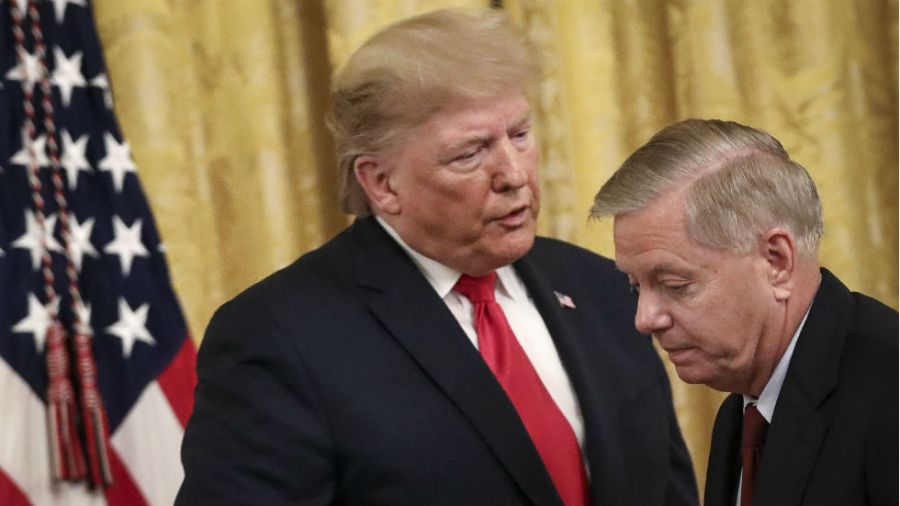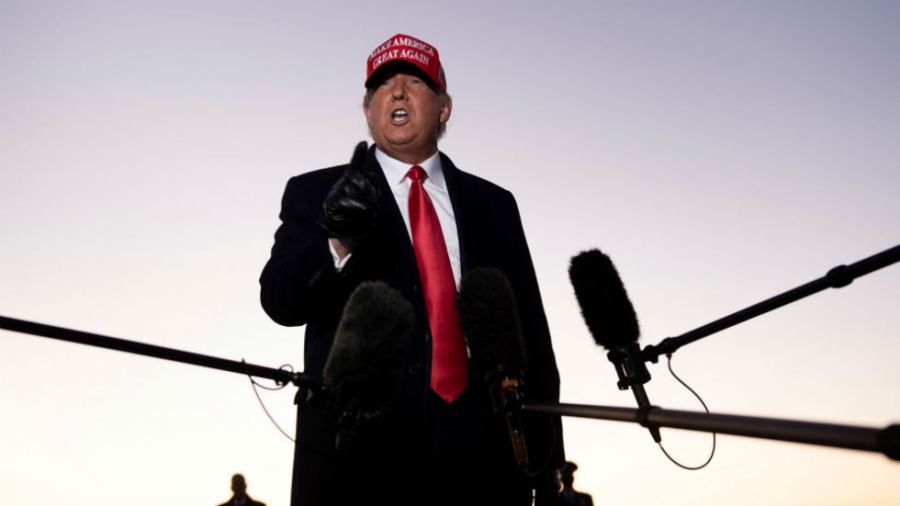Six ways Trump has changed the GOP
Former President Donald Trump has dramatically reshaped the Republican Party in his own image, leaving marks that have outlived his presidency — and could potentially outlive him.
It’s not unusual for a president, current or former, to hold sway over his party and its voters. But Trump’s impact on the GOP stands out for its breadth; Trump has influenced the party and its members on everything from policy to rhetorical style, as Republican officials and candidates look to recreate the movement that helped propel Trump to the White House six years ago.
Here are six ways Trump has significantly changed the GOP.
He’s turned it more against mainstream media

Signage is seen at CNN center, Thursday, April 21, 2022, in Atlanta. (AP Photo/Mike Stewart, File)
Trump may not have invented the term “fake news” as he has claimed. But there’s little doubt that he brought it into the GOP’s everyday vernacular.
Republicans have long fueled skepticism in the mainstream media, casting unfriendly news outlets and journalists as liberals with their own political agendas that obscure what they see as the truth.
But Trump has driven Republican animosity toward the so-called mainstream media to new heights. One former Trump campaign aide described the former president’s influence as fundamentally altering the way Republicans think about the news and the people who report it.
“When Republicans would talk about the ‘liberal media,’ it was about pointing out bias,” the former aide said. “The president, what he did was he took that a step further, right? It’s not just bias. It’s straight-up lies.”
That strategy has reshaped the GOP’s approach to unflattering headlines and news stories, the former aide said.
“I think there’s a sense now that you don’t have to counter,” the former aide said. “You can more or less ignore this stuff and say it’s all made up.”
He’s made attacking opponents a signature

Former President Trump gives a keynote address during the America First Policy Institute Summit in Washington, D.C., on Tuesday, July 26, 2022. (Greg Nash)
Political attacks are nothing new, but since taking his perch atop the GOP in 2016, countless Republicans have sought to mimic Trump’s penchant for bombastic and vitriolic rhetoric, deploying it against their opponents, but within and outside of their own party.
Trump’s critics have accused him of lowering the political discourse among Republicans by encouraging petty — and very often personal — attacks over substantive policy discussions or principled debates.
But to many Republicans, Trump has given the party the language and resolve to fight back. Ford O’Connell, a Trump-aligned Republican strategist and former congressional candidate, said that the GOP is now more focused on the “bigger picture”: winning elections at any cost.
“In the past, if someone like Mitt Romney or Todd Akin made a snafu on the stump, the Republicans would let the opposition drag them down,” O’Connell said.
“The No. 1 chief thing that he has given the party is a backbone to fight, not only the Democrats but anyone who wants to bring them down, then not back down when the fear mongering gets turned up to a 10.”
He’s sparked opposition to institutions

An FBI seal is seen on a wall on Aug. 10, 2022, in Omaha, Neb. (AP Photo/Charlie Neibergall, File)
Before, during and after his time in the White House, Trump called into question the legitimacy and effectiveness of key institutions — in the government, the media and the world at large.
That willingness to attack what many Americans see as pillars of U.S. democracy and international order has implanted itself firmly into GOP orthodoxy over the years. Republicans routinely rail against “The Swamp” — Trump’s ill-defined term for institutional corruption — and organizations like the FBI and NATO.
“Let’s take NATO, for example,” O’Connell said. “The theory behind NATO is fantastic. The problem is that it was living on borrowed time and not functioning effectively. And we see the same thing with the FBI.”
“When it comes to institutions, if you’re not judging the efficiency and the effectiveness of the institutions, then you’re probably not doing your job as an American.”
In perhaps one of the most lasting examples of Trump’s institutional distrust, the Republican National Committee (RNC) voted earlier this year to withdraw from the Commission on Presidential Debates, an organization that Trump repeatedly hammered as biased against the GOP and its candidates.
For some Republicans, that decision was seen as one of the clearest examples of Trump’s influence over the GOP.
“If you had told me 10 years ago that we simply weren’t going to participate anymore, I’d say you were crazy,” one former Republican campaign adviser said. “But seeing the way [Trump] has shaped things now, I’m surprised it didn’t happen sooner.”
He’s fueled skepticism in the country’s elections

A poll worker stamps a vote-by-mail ballot at a ballot drop-off location at the Miami-Dade Elections Department during the primary election, Aug. 23, 2022, in Doral, Fla. (AP Photo/Lynne Sladky, File)
Trump’s efforts to challenge the results of the 2020 presidential election were seen by many as the ultimate taboo; a self-serving campaign to hold onto power at the expense of American democracy.
But that notion has proved to have staying power within the GOP. A New York Times/Siena College poll released over the summer found that 60 percent of Republican voters believe that Trump was the legitimate winner of the 2020 election. Even more recently, a Morning Consult survey showed that only 44 percent of GOP voters have at least some trust in the country’s electoral process.
That trend has played out among GOP lawmakers and candidates, as well. Fueled by Trump’s false claim that the 2020 election was “rigged,” Republican governors and state legislators have pushed a swath of new voting laws and restrictions.
At the same time, several Republican candidates in battleground states have refused to say whether they will accept the results of their own contests.
To be sure, Republicans have long spoken about the need for enhanced “election security,” a subject that helped lead to the proliferation of voter identification laws, mostly in red states. But some Republicans say that Trump helped focus the GOP on deeper issues in the electoral system.
“There have always been problems in the system,” Keith Naughton, a veteran Republican strategist, said. “Nobody wanted to touch it, but it was bubbling beneath the surface and Trump kind of brought it to light. He brought it to the fore, made it possible to discuss it and for people to express what they really thought about it.”
He’s made fealty to him a necessity for party survival

One-time critics of Trump, like Sen. Lindsey Graham (R-S.C.) have become some of his most loyal defenders. (Getty)
Despite many Republicans’ deep reluctance to embrace Trump during his first successful bid for the White House in 2016, most warmed up to him quickly after he took office. Those who didn’t have largely become persona non grata within the GOP.
Trump has left little room for dissent in the modern Republican Party, forcing its members to make a choice: demonstrate absolute loyalty to him and his agenda or be booted from the party.
One-time Trump critics, like Sen. Lindsey Graham (R-S.C.), have remade themselves into some of the former president’s most ardent defenders and allies. Meanwhile, many of those who broke with him have found themselves politically isolated.
Take Rep. Liz Cheney (R-Wyo.) for example. Cheney was one of 10 House Republicans who voted in early 2021 to impeach Trump for his role in the Jan. 6 riot at the U.S. Capitol. That vote, combined with her ongoing criticism of the former president, ultimately cost her both her post in House GOP leadership and renomination this year.
The insistence on fealty to Trump is a marked change from the GOP’s approach nearly a decade ago, when the RNC set its sights on creating a big tent party that welcomed conservatives with a range of views.
And while the former president won’t be around forever, Republicans say that, for now, one thing is clear: The GOP is still Trump’s party.
He altered the GOP’s view of the world

Trump’s approach toward international alliances has significantly shifted the party away from its stance during the time of former presidents Ronald Reagan and George W. Bush. (Getty)
Trump barreled into political career with a promise to put “America first” by reassessing international alliances, rebuilding the country’s domestic manufacturing sector and avoiding “forever wars.”
That approach is now part of Republican orthodoxy, marking a massive shift away from the GOP of former presidents like Ronald Reagan and George W. Bush who embraced international free trade and alliances.
Critics accuse Trump of seeking to push the U.S. toward isolationism, arguing that his “America first” focus has weakened the country’s international clout and interrupted a steady march toward a more interconnected world.
2024 Election Coverage
Trump’s allies, however, say he simply got Republicans to take a fresh look at foreign policy and international trade.
“He’s changed the entire world view of the Republican Party when it comes to international relations and foreign relations,” O’Connell said. “Maybe we were overextended to begin with and it was hurting our domestic interests.”
“The idea that that is isolationist is almost insane to say,” he added. “We were doing it wrong before. When you’re acting in the U.S.’s best interests, you’re not being isolationist because our interests are aligned around the world.”
Copyright 2023 Nexstar Media Inc. All rights reserved. This material may not be published, broadcast, rewritten, or redistributed.

